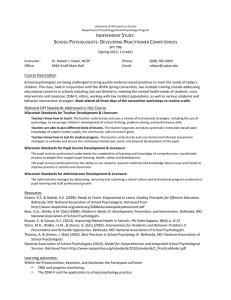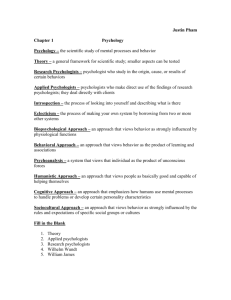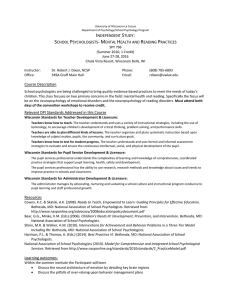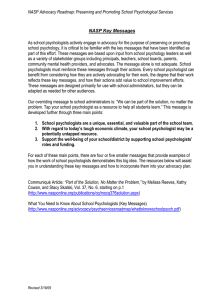I S :
advertisement
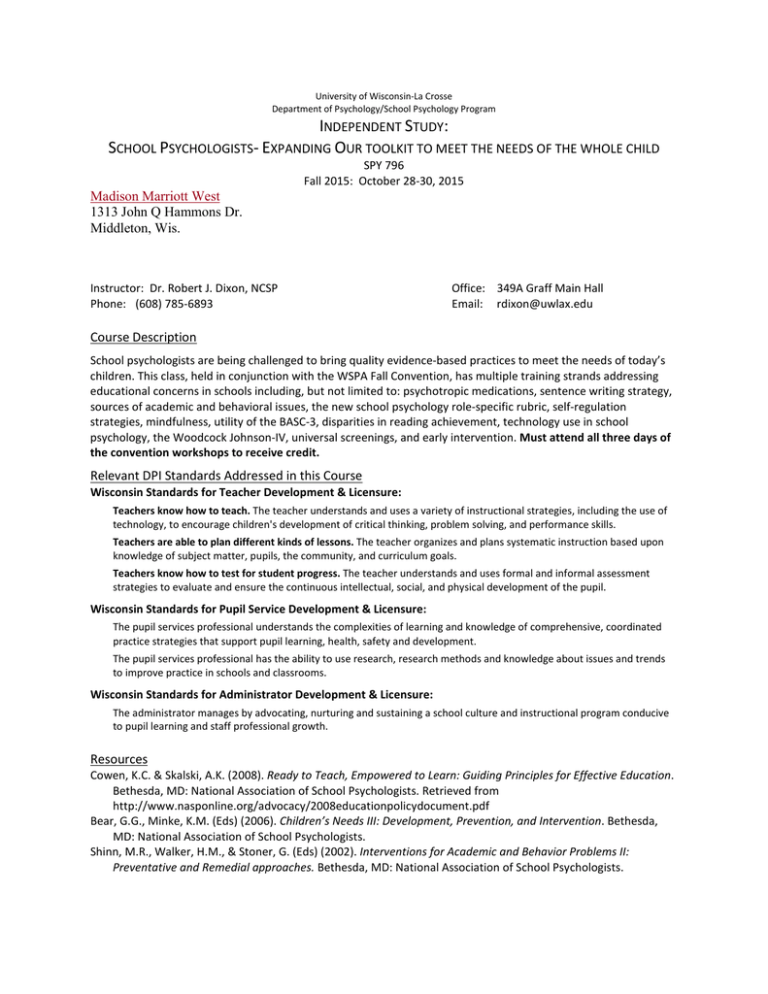
University of Wisconsin-La Crosse Department of Psychology/School Psychology Program INDEPENDENT STUDY: SCHOOL PSYCHOLOGISTS- EXPANDING OUR TOOLKIT TO MEET THE NEEDS OF THE WHOLE CHILD SPY 796 Fall 2015: October 28-30, 2015 Madison Marriott West 1313 John Q Hammons Dr. Middleton, Wis. Instructor: Dr. Robert J. Dixon, NCSP Phone: (608) 785-6893 Office: 349A Graff Main Hall Email: rdixon@uwlax.edu Course Description School psychologists are being challenged to bring quality evidence-based practices to meet the needs of today’s children. This class, held in conjunction with the WSPA Fall Convention, has multiple training strands addressing educational concerns in schools including, but not limited to: psychotropic medications, sentence writing strategy, sources of academic and behavioral issues, the new school psychology role-specific rubric, self-regulation strategies, mindfulness, utility of the BASC-3, disparities in reading achievement, technology use in school psychology, the Woodcock Johnson-IV, universal screenings, and early intervention. Must attend all three days of the convention workshops to receive credit. Relevant DPI Standards Addressed in this Course Wisconsin Standards for Teacher Development & Licensure: Teachers know how to teach. The teacher understands and uses a variety of instructional strategies, including the use of technology, to encourage children's development of critical thinking, problem solving, and performance skills. Teachers are able to plan different kinds of lessons. The teacher organizes and plans systematic instruction based upon knowledge of subject matter, pupils, the community, and curriculum goals. Teachers know how to test for student progress. The teacher understands and uses formal and informal assessment strategies to evaluate and ensure the continuous intellectual, social, and physical development of the pupil. Wisconsin Standards for Pupil Service Development & Licensure: The pupil services professional understands the complexities of learning and knowledge of comprehensive, coordinated practice strategies that support pupil learning, health, safety and development. The pupil services professional has the ability to use research, research methods and knowledge about issues and trends to improve practice in schools and classrooms. Wisconsin Standards for Administrator Development & Licensure: The administrator manages by advocating, nurturing and sustaining a school culture and instructional program conducive to pupil learning and staff professional growth. Resources Cowen, K.C. & Skalski, A.K. (2008). Ready to Teach, Empowered to Learn: Guiding Principles for Effective Education. Bethesda, MD: National Association of School Psychologists. Retrieved from http://www.nasponline.org/advocacy/2008educationpolicydocument.pdf Bear, G.G., Minke, K.M. (Eds) (2006). Children’s Needs III: Development, Prevention, and Intervention. Bethesda, MD: National Association of School Psychologists. Shinn, M.R., Walker, H.M., & Stoner, G. (Eds) (2002). Interventions for Academic and Behavior Problems II: Preventative and Remedial approaches. Bethesda, MD: National Association of School Psychologists. Thomas, A. & Grimes, J. (Eds) (2002). Best Practices in School Psychology IV. Bethesda, MD: National Association of School Psychologists. National Association of School Psychologists (2010). Model for Comprehensive and Integrated School Psychological Services. Retrieved from http://www.nasponline.org/standards/2010standards/2_PracticeModel.pdf Learning outcomes: Within the Preconvention, Keynotes, and Sectionals the Participant will learn • Understanding of the current trends related to the utilization of psychotropic medications in youth. • When and how the sentence writing strategies may be used to teach struggling writers tools to improve their writing skills. • To review up-to-date scientific literature on the assessment of childhood anxiety disorders. • The utilization of neuropsychology principles to aid in understanding the cause of academic and behavior problems. • Understanding of a role-specific evaluation tool for school psychologists. • Key changes to school and district report cards and the potential impact of those changes. • Innovative activities to get students moving, talking, and reflecting on their learning. • To describe the development of self-regulation within the context of the external environment and the primary caregiver. • The theory of mindfulness and how it can enhance personal well-being. • How the BASC-3 helps to identify students at risk for behavioral and emotional problems. • Critical analysis of the link between poor reading achievement and poverty as well as the relationship between dialect and the black-white reading achievement gap. • Knowledge of how to use risk management strategies and using technology in school psychology practices • The Patterns of Strengths and Weaknesses with the Woodcock-Johnson IV to identify learning disabilities. • To identify the impact of student behavioral and emotional problems on school functioning. • Strategies to collect and track school-wide academic, discipline, and behavioral data to evaluate impact of screening and early interventions • Understanding of how teachers’ experiences influenced their work with LGBTQ students. • The NASP Ethical Guidelines (2010) Course Expectations Attendance (50%) • Attend the entire conference - attendance verification will be conducted with the sign in and evaluation sheets for each sectional. Participants must attend an entire pre-conference session on Wednesday, sectionals that account for the entire day Thursday, and half the day on Friday to receive credit for attendance. Paper (50%) • 3-5 page paper on how you are going to apply the concepts learned at the conference to your local education authority (e.g., school or district, etc.). Papers can focus on all the information presented over the three days or focus specifically certain topics that are more relevant or applicable to the LEA. Keep in mind the goals of the conference and the relevant teacher, pupil service and administrative education standards for licensure. All materials must be received via email or snail mail by December 1. Grades will be posted December 15. Grading Procedure Completing the attendance and paper requirement will receive an A. Failure to complete attendance verification and/or assignments will result in a course grade of an F. Late papers will be reduced by a half grade. Tentative Course Outline (Any changes will be announced Wednesday Morning) October 28, 2015 (Wednesday) Pre-Convention Workshop 9 a.m.-4:15 p.m. • • The Use of Psychotropic Medications in Youth: Considerations for the Classroom SIM Fundamentals in the Sentence Writing Strategy and Proficiency in the Sentence Writing Strategy (2 strategies in 1 day!) October 29, 2015 (Thursday) Convention Workshop 8:45-10 a.m. Keynote: • LGBTQ Youth: Supporting Teachers and Supporting Students • Evaluation Rubric for Wisconsin School Psychologists: Available Now 10:30 a.m. – 12 p.m. • State Report Cards • Panel Discussion on Group Interventions 1:30 – 4:45 p.m. • Addressing Self-Regulation Issues in Children with Emotional Challenges • Mindfulness: Enhancing Your Personal and Professional Life • BASC-3 Updates by Pearson • Beyond ‘just breath’: Helping Kids Face and Conquer Anxiety 5-6 p.m. Student Poster Session and Networking March 27, 2015 (Friday) Convention Workshop • Poverty, Dialect & the “Achievement Gap” • Best Practices in Risk Management & Ethical Practices When Using Technology 9:00-12:15 p.m. • An Introduction to the WJ-IV by Haughton Mifflin • Using Universal Screening to Inform Interventions for Behavioral & Emotional Concerns • Critical Issues Facing School Psychologists: Resources & Networking You are expected to be on time and attend the full-allotted time period. Please do not repeat any sessions. Failure to attend any of the specified times for any reason will result in a failing grade. You are responsible for signing in and out of each sectional Miscellaneous Academic Integrity Academic integrity is essential to the life of a student and the educational process. Academic misconduct is an act in which a student: (a) Seeks to claim credit for the work or efforts of another without authorization or citation; (b) Uses unauthorized materials or fabricated data in any academic exercise; (c) Forges or falsifies academic documents or records; (d) Intentionally impedes or damages the academic work of others; (e) Engages in conduct aimed at making false representation of a student's academic performance; or (f) Assists other students in any of these acts. For a detailed description of the university’s policies refer to: http://www.uwlax.edu/stuserv/OSL/main2.html Disability Any student with a documented disability (e.g., physical, learning, psychiatric, vision, or hearing, etc.) who needs to arrange reasonable accommodations must contact the instructor and the Disability Resource Services Office, 165 Murphy Library (785-6900) at the beginning of the semester. Students who are currently using the Disability Resource Services office will have a copy of a contract that verifies they are qualified students with disabilities who have documentation on file in the Disability Resource Services office.

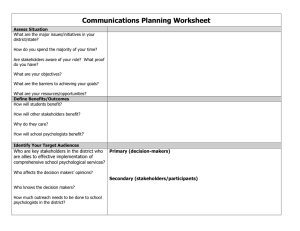
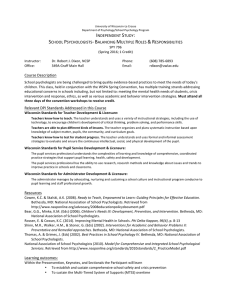


![[Today’s Date] [Your Supervisor’s First Name] [Your School or District’s Name]](http://s2.studylib.net/store/data/010451343_1-ed5410b4013e6d3fbc1a9bbd91a926a9-300x300.png)
